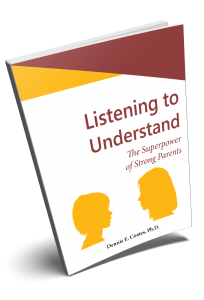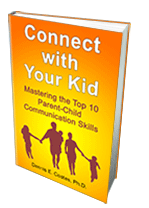Truth-telling time.
The most common mistake parents make when interacting with their child is failing to recognize when they should be listening, and they miss the opportunity.
I call these opportunities listening moments.
Here are some of the most common parent-child situations that call for your best listening skills:
- When you ask an open-ended question, and they reply with their answer.
- When they come to you with a problem.
- When they offer an idea, and you have a problem with it.
- When they react defensively to your feedback.
- When you don’t agree with their opinion about something.
- When your child wants to do something you don’t want them to do.
- When your child is being emotional about something.
What sometimes happens is that instead of listening to understand, a parent will react to one of these situations emotionally: with frustration, shock, dismay, hurt, or even anger. The result is misunderstanding or conflict. The child has a need to express and can’t get through. They feel rejected.
Imagine that if being blocked like this becomes a pattern, a child could eventually give up on connecting with the parent. By the time a kid is in his teens, the parent-child relationship could be seriously damaged. You won’t have the connection and trust you need to offer wisdom and guidance while they’re growing into adults. Plenty of horrible mistakes can be made during adolescence, mistakes that can be avoided if there is an open channel of communication.
Sadly, it’s an old story.
The second most common listening mistake is failing to engage effective skills, even if you realize you should be listening.
 These skills are so important that I created an ebook, Listening to Understand: The Superpower of Strong Parents, which any parent can download free.
These skills are so important that I created an ebook, Listening to Understand: The Superpower of Strong Parents, which any parent can download free.
 This ebook is adapted from Chapter 4 of Connect with Your Kid: How to Master the Top 10 Parent-Child Communication Skills. These are the skills for handling the situations I mentioned above, all of which involve an effective listening component.
This ebook is adapted from Chapter 4 of Connect with Your Kid: How to Master the Top 10 Parent-Child Communication Skills. These are the skills for handling the situations I mentioned above, all of which involve an effective listening component.
Truth: A lot depends on how you interact with your child.

